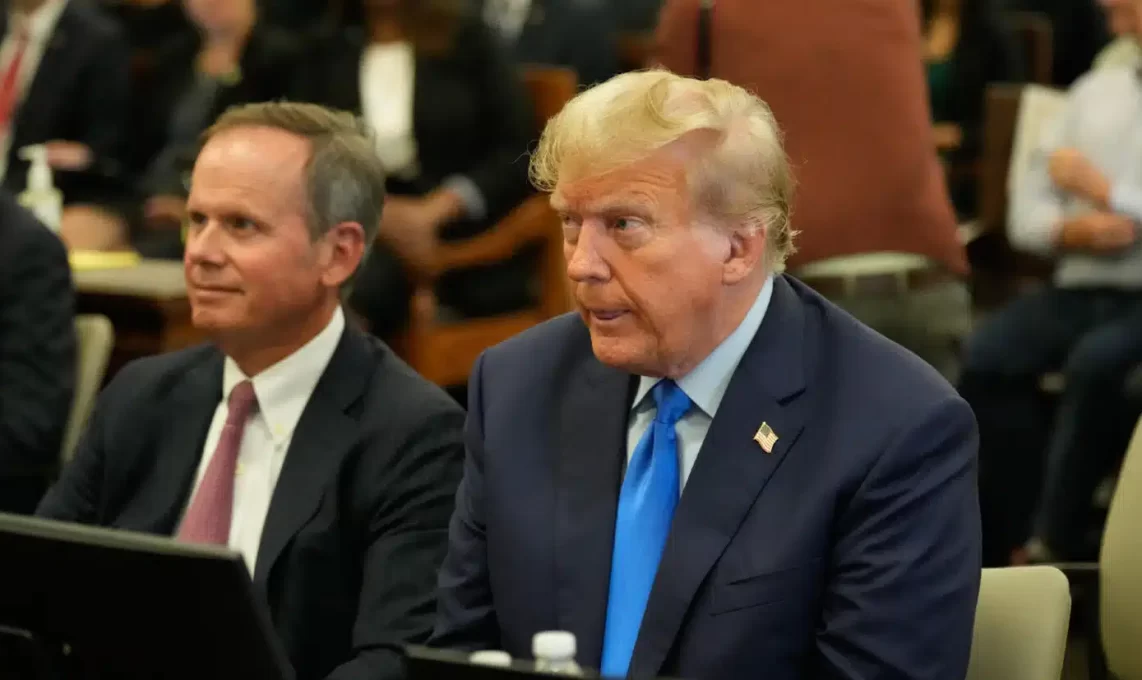
A Deutsche Bank AG executive confirmed on Tuesday what former President Donald Trump has consistently stated about the fraud lawsuit led by New York Attorney General Letitia James: There’s no evidence of victims.
James’ case alleges that the Trump Organization exaggerated property values to deceive banks like Deutsche when securing business loans.
The lawsuit claims that the company inflated property values by up to $3.6 billion to secure better loan terms, as reported by Bloomberg.
New York seeks $250 million in penalties and a ruling barring the Trump Organization from conducting business in the state.
During questioning by Trump’s attorney Jesus Suarez, David Williams, a managing director at the bank involved in several Trump Organization loans, affirmed that Deutsche independently evaluates a client’s financial condition.
“Is the bank capable of reaching its own judgment based on the evaluation it makes of the guarantor’s financial condition?”
Williams stated, “Certainly, yes.” He explained that the bank reviews a client’s financial statements and adjusts the company’s value based on its assessment as part of due diligence.
He clarified that differences in asset values between the client and the bank aren’t disqualifying factors for credit extension, attributing them to varying opinions and reliance on estimates in financial statements.
“As part of our due diligence, we subject a client’s asset value to adjustments,” Williams said. “It’s part of our underwriting process. We apply it to every client regardless of what’s reported.”
“Is a difference of opinion in asset values between the client and the bank a disqualifying factor to extend credit?” Suarez asked Williams.
“No,” he replied.
“Why not?”
“It’s just a difference of opinion. … I think we expect clients to provide information to be accurate.” But Williams added that such financial statements are made “largely relying on the use of estimates.”
Before testifying, Trump claimed his company’s financial statements were conservative and included disclaimers urging lenders to conduct their own due diligence.
Post-testimony, Trump reiterated, “There’s no case here. There are no victims. The banks aren’t a victim. The insurance companies aren’t a victim. Everybody got paid.”
Former federal prosecutor Andrew McCarthy echoed Trump’s sentiment, emphasizing the sophistication of banks in appraising assets and disputing claims of Trump tricking lenders.
McCarthy argued that even if Trump’s properties were overvalued, there’s no proof that the banks would have altered their interest rates, considering various factors.
“First, if there were proof that Trump had ripped banks off in this manner and to this extent, this would have been a huge criminal case that no prosecutor’s office would pass up — certainly not the famously aggressive feds in the Southern District of New York (where I worked for two decades).”
He continued, “and certainly not the Manhattan District Attorney’s Office, which twice litigated all the way to the Supreme Court to get Trump’s financial records, and which was not too embarrassed to bring a ludicrous indictment over the comparative chump change ($130,000) in hush-money Trump paid to a porn star.”
McCarthy went on to argue, as Trump has, that “banks in high-end lending are sophisticated financial actors who do not take the debtor’s word for it when it comes to valuing assets — they have entire departments of experienced appraisers assessing values.”
Following Williams’ testimony, Trump’s attorney Christopher Kise requested a directed verdict favoring Trump, contending that the bank’s testimony refuted the claim that inflated property values influenced loan decisions.
TRENDING: Supreme Court Rules 2 Republican Lawmakers Must Testify in Voting Rights Lawsuit
“The bank had no problem with a $2 billion difference, a $3 billion difference — large changes to net worth are not unusual,” Kise said, according to Bloomberg. “There’s been no demonstration of any materiality issues at all.”
Justice Arthur Engoron suggested he’d rule later but hinted it might not favor Trump, stating that lenders’ satisfaction doesn’t negate potential statute violations.
“The mere fact that lenders were happy doesn’t mean the statute wasn’t violated,” the judge said.
Engoron previously ruled, before a trial, that Trump and his organization committed fraud by inflating property values. The ongoing trial aims to determine penalties.
Some question whether this case would exist without Trump’s 2024 presidential candidacy, insinuating political motives behind James’ pursuit to weaken a top Republican candidate.
The call to dismiss the case immediately, with prejudice, suggests preventing its future re-filing.









